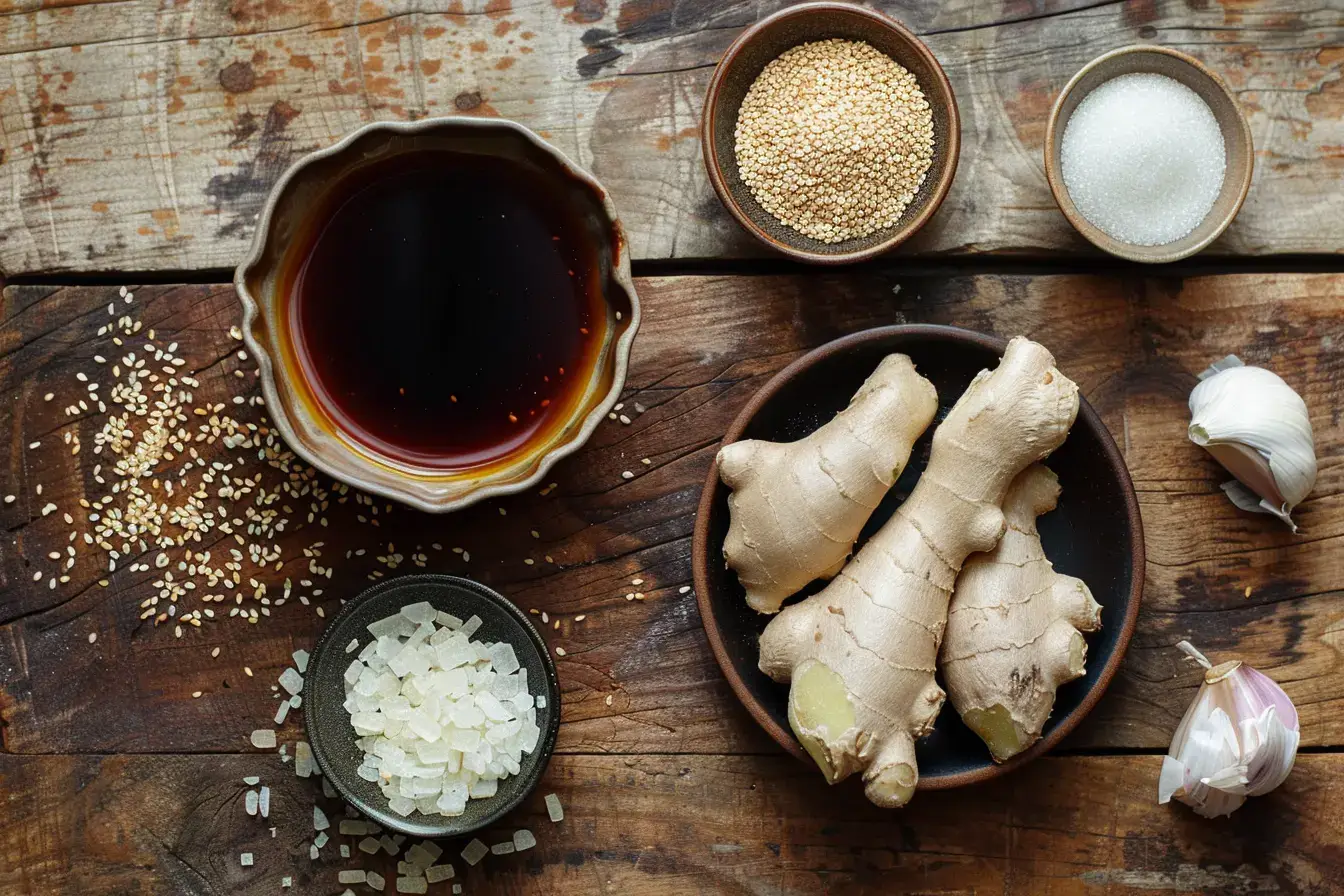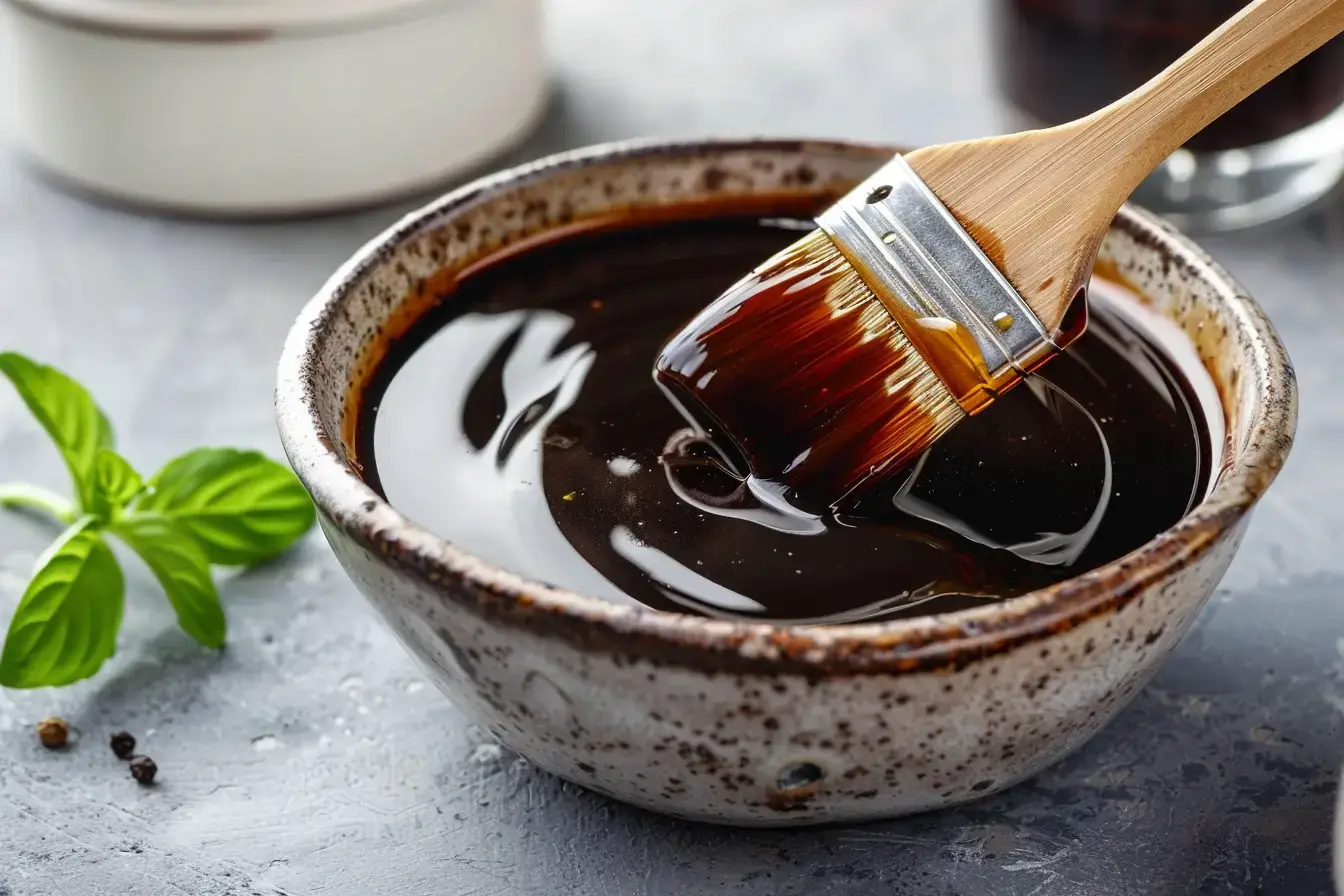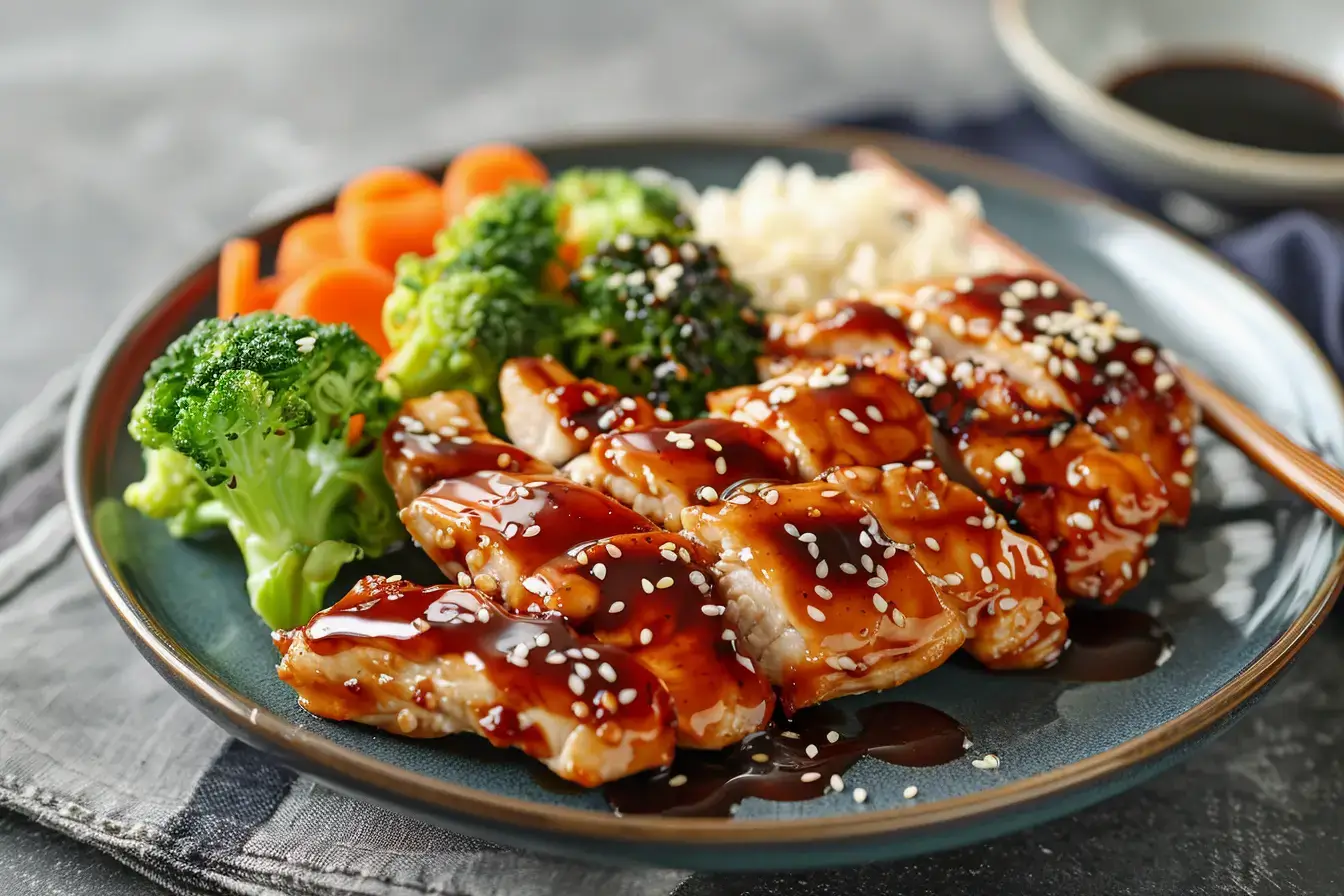Teriyaki sauce is a popular condiment, especially in Japanese cuisine. But is teriyaki sauce healthy? Many people wonder if it fits into a nutritious diet or if its high sodium and sugar content outweigh its benefits. This article dives into the nutritional aspects, health benefits, and potential risks of teriyaki sauce, helping you make informed dietary choices. We’ll also explore how teriyaki sauce fits into different diets, compare store-bought and homemade versions, and provide practical tips for healthier usage. Let’s uncover the truth about teriyaki sauce.
Introduction to Teriyaki Sauce
Teriyaki sauce has a rich history. Originating from Japan, it has become a staple in many kitchens worldwide. This sweet and savory sauce enhances the flavor of meats, vegetables, and even tofu. It’s a versatile condiment that brings a burst of umami to any dish.
In the beginning, teriyaki sauce was made using simple ingredients like soy sauce, sake, and sugar. Over time, variations emerged, incorporating different elements such as ginger, garlic, and sesame seeds. Today, it’s a beloved sauce used in countless recipes.
However, with its growing popularity, questions about its healthiness have arisen. Does teriyaki sauce contribute to a healthy diet, or are its sodium and sugar levels too high? This article aims to answer these questions by examining the sauce’s nutritional content and its effects on health.
By the end of this comprehensive guide, you’ll have a clear understanding of whether incorporating teriyaki sauce into your meals is a good idea. We’ll start by breaking down its nutritional composition and then delve into the health benefits and concerns associated with its consumption.
Nutritional Composition
Nutritional Breakdown
To determine if teriyaki sauce is healthy, we first need to analyze its nutritional composition. Teriyaki sauce typically contains soy sauce, sake or mirin, sugar, and various spices. Each ingredient contributes to the overall nutritional profile.
Calories and Macronutrients A tablespoon of teriyaki sauce generally contains around 15 calories. A majority of the calories are from sugars, which are mainly carbohydrates. Although it adds flavor to dishes, teriyaki sauce is not calorie-dense, which is a plus for those watching their calorie intake. However, the sugar content can be a concern if consumed in large quantities.
Sodium Content One of the main nutritional concerns with teriyaki sauce is its high sodium content. A tablespoon of the sauce can contain up to 600 milligrams of sodium, which is about 25% of the recommended daily intake. Consuming enough sodium could cause an rise in blood pressure, as well as other issues with cardiovascular health. Therefore, it’s crucial to use teriyaki sauce sparingly, especially for those on a low-sodium diet.
Micronutrients While teriyaki sauce is not a significant source of vitamins, it does contain some minerals. It has small amounts of iron, calcium, and potassium. These minerals are essential for various bodily functions, but the amounts present in teriyaki sauce are minimal.
Additives and Preservatives Store-bought teriyaki sauces often contain additives and preservatives to extend their shelf life. These can include stabilizers, artificial flavors, and colors. Homemade teriyaki sauce usually lacks these additives, making it a healthier option.
By understanding the nutritional breakdown, we can make informed decisions about incorporating teriyaki sauce into our diet. Next, we’ll explore the potential health benefits of this popular condiment.
Potential Health Benefits
Rich in Antioxidants Teriyaki sauce contains ingredients like ginger and garlic, which are known for their antioxidant properties. Antioxidants benefit fight oxidative stress within the body, and reduce the chance of developing chronic illnesses.
Low in Saturated Fats Teriyaki sauce is low in saturated fats, which are linked to heart disease. This makes it a preferable choice compared to other high-fat sauces and dressings.
Source of Essential Minerals As mentioned earlier, teriyaki sauce provides small amounts of iron and calcium. Iron is vital for producing hemoglobin, while calcium is crucial for bone health.
Enhances Flavor without Excess Calories One of the primary benefits of using teriyaki sauce is its ability to enhance the flavor of dishes without adding excessive calories. This is particularly beneficial for those who are trying to shed weight or keep an ideal weight.
May Boost Immunity Ingredients like garlic and ginger not only add flavor but also boost the immune system. They have anti-inflammatory and antimicrobial properties, contributing to overall health.
Although teriyaki sauce has notable health benefits, it’s essential to balance its consumption with an awareness of its high sodium and sugar content. Up next, we’ll delve deeper into the health concerns associated with teriyaki sauce consumption.
Health Benefits of Teriyaki Sauce
Potential Health Benefits
Rich in Antioxidants Teriyaki sauce, particularly when made with fresh ingredients like ginger and garlic, is rich in antioxidants. Antioxidants play a vital part to neutralize free radicals within the body. By doing so, they help reduce oxidative stress, which can lower the risk of chronic diseases such as cancer and heart disease. These ingredients not only enhance the flavor but also contribute significantly to your overall health.
Low in Saturated Fats Unlike many other sauces, teriyaki sauce is low in saturated fats. Consumption of saturated fats can rise the risk of developing heart disease. Therefore, using teriyaki sauce can be a healthier alternative to butter or cream-based sauces. It adds a robust flavor to your meals without the unhealthy fats, making it a heart-friendly option.
Source of Essential Minerals While teriyaki sauce may not be a powerhouse of vitamins, it does provide essential minerals like iron and calcium. Iron is crucial in the production of hemoglobin. It is the substance that transports oxygen into the blood. Calcium is essential for keeping strong teeth and bones. Although the amounts are small, every bit helps in contributing to your daily mineral intake. For more information on the importance of these minerals, visit Healthline Nutrition.
Enhances Flavor without Excess Calories One of the best things about teriyaki sauce is that it can significantly enhance the flavor of your dishes without adding too many calories. This makes it a great choice for those who are watching their caloric consumption. A little bit of teriyaki sauce can go a long way in making healthy foods like vegetables and lean proteins more palatable.
May Boost Immunity Garlic and ginger, common ingredients in teriyaki sauce, are known for their immune-boosting properties. Garlic has been shown to enhance the functioning of the immune system, while ginger has anti-inflammatory effects that can help in fighting off infections. Including teriyaki sauce in your diet can thus provide a minor boost to your immune defenses.
Although teriyaki sauce has these potential health benefits, it’s important to consume it in moderation. Next, we’ll explore the health concerns and risks associated with teriyaki sauce.
Health Concerns and Risks
High Sodium Content
Impact on Health One of the major drawbacks of teriyaki sauce is its high sodium content. Excessive sodium intake can lead to several health issues, including hypertension, heart disease, and stroke. For individuals who are sensitive to sodium or have existing cardiovascular conditions, consuming teriyaki sauce can exacerbate these problems.
Daily Recommended Intake The recommended daily sodium intake for an average adult is about 2,300 milligrams, but even less is suggested for those with high blood pressure. A single tablespoon of teriyaki sauce can contain around 600 milligrams of sodium, which is roughly 25% of the daily limit. This high sodium content makes it essential to use teriyaki sauce sparingly, especially if you are trying to reduce your sodium intake.
Low-Sodium Alternatives To mitigate the high sodium content, consider making your own teriyaki sauce at home. This allows you to control the amount of sodium by using low-sodium soy sauce or other sodium substitutes. Additionally, there are store-bought low-sodium versions available that can be a better option for those concerned about their sodium intake.
Sugar Content
Added Sugars and Their Effects Teriyaki sauce often contains a significant amount of added sugars, which contribute to its characteristic sweetness. High sugar intake is linked to various health problems, including obesity, type 2 diabetes, and tooth decay. Consuming foods high in added sugars can also lead to energy spikes and crashes, affecting your overall energy levels throughout the day.
Comparison with Other Sauces Compared to other condiments, teriyaki sauce can be relatively high in sugar. For example, a tablespoon of teriyaki sauce can contain up to 3 grams of sugar. While this might not seem much, it can add up quickly, especially if you are using the sauce in large quantities or multiple times a day.
Tips to Reduce Sugar Intake To reduce sugar intake, you can make a healthier version of teriyaki sauce at home using natural sweeteners like honey or maple syrup. These alternatives can provide the sweetness you desire with a lower glycemic index. Additionally, reducing the overall amount of sauce used in your meals can help keep your sugar consumption in check.
By understanding these health concerns and making mindful choices, you can enjoy the delicious taste of teriyaki sauce while minimizing its potential risks. Next, we will discuss how teriyaki sauce fits into different diets and lifestyles.
Teriyaki Sauce in Diets
Teriyaki Sauce for Weight Loss
Caloric Density and Portion Control When considering if teriyaki sauce is healthy for weight loss, it’s important to focus on caloric density and portion control. Teriyaki sauce is relatively low in calories, with approximately 15 calories per tablespoon. This makes it a favorable option for adding flavor without significantly increasing calorie intake. However, the sugar content can be a concern if used excessively. To maintain a balanced diet, use teriyaki sauce in moderation, enhancing the taste of your meals without overindulging.
Balancing Teriyaki Sauce in a Weight Loss Diet To integrate teriyaki sauce into a weight loss diet effectively, balance is key. Pair the sauce with lean proteins such as chicken, tofu, or fish, and complement with plenty of vegetables. This not only creates a satisfying meal but also ensures you’re consuming a nutrient-dense diet. For instance, teriyaki chicken with a side of steamed broccoli and brown rice can be a delicious and balanced meal. Try serving it with this Ultimate Guide to Rice Pilaf.
Healthier Homemade Versions Creating your own teriyaki sauce at home allows for greater control over ingredients. Opt for low-sodium soy sauce, natural sweeteners like honey, and fresh garlic and ginger. By doing so, you can reduce the overall sodium and sugar content, making it a healthier option. A simple recipe includes soy sauce, mirin, a touch of honey, and minced garlic and ginger. This homemade version can be just as flavorful while being much better for your health. If you’re looking for more healthy homemade recipes, you might enjoy this Baked Crab Rangoon Recipe.
Teriyaki Sauce in Different Diet Plans
Compatibility with Low-Carb and Keto Diets For those on low-carb or keto diets, the question arises: is teriyaki sauce healthy for these plans? Traditional teriyaki sauce, with its high sugar content, may not fit well. However, by tweaking the recipe, it can be made compatible. Substitute regular soy sauce with tamari or coconut aminos and use a low-carb sweetener like stevia or erythritol. This way, you can enjoy teriyaki flavor without breaking your diet rules.
Modifications for Vegan Diets Vegans can also enjoy teriyaki sauce by ensuring that all ingredients are plant-based. Most traditional recipes are naturally vegan, but it’s always good to check labels for hidden animal products. Homemade vegan teriyaki sauce can be made using soy sauce, rice vinegar, maple syrup, and fresh ginger and garlic. Pair this with tofu or tempeh and a variety of vegetables for a delicious vegan meal.
Adjustments for Gluten-Free Diets Those with gluten sensitivities need to ensure their teriyaki sauce is gluten-free. Many store-bought sauces contain wheat-based soy sauce. Opt for gluten-free tamari or specially labeled gluten-free teriyaki sauce. Making it at home using tamari, mirin, and a gluten-free thickener like cornstarch can ensure it’s safe for gluten-free diets.
By understanding how teriyaki sauce fits into various diet plans, you can enjoy its unique flavor without compromising your dietary goals. Next, we’ll compare the nutritional aspects of store-bought versus homemade teriyaki sauce.
Comparing Store-Bought and Homemade Teriyaki Sauce
Store-Bought vs. Homemade Teriyaki Sauce
Ingredients and Nutritional Differences When deciding if teriyaki sauce is healthy, the choice between store-bought and homemade versions is crucial. Store-bought sauces often contain high amounts of sodium, sugar, and preservatives. While convenient, these can contribute to health issues if consumed regularly. On the other hand, homemade teriyaki sauce allows you to control the ingredients, making it a healthier choice. If you’re curious about other sauces, check out why Raos Sauce is So Good.
Benefits of Making Teriyaki Sauce at Home Homemade teriyaki sauce is not only healthier but also customizable. You can adjust the sweetness, saltiness, and overall flavor to your liking. Using fresh ingredients like garlic, ginger, and low-sodium soy sauce ensures a fresher taste and better nutritional profile. Additionally, homemade sauce typically lacks the preservatives and artificial additives found in store-bought versions. For another great homemade sauce recipe, try this Pizza Sauce Recipe.
Simple Homemade Teriyaki Sauce Recipe Creating your own teriyaki sauce at home is straightforward. Here’s a simple recipe:
- 1/2 cup low-sodium soy sauce
- 1/4 cup mirin or rice vinegar
- 2 tablespoons honey or maple syrup
- 1 tablespoon minced garlic
- 1 tablespoon minced ginger
- Optional: 1 teaspoon cornstarch mixed with 1 tablespoon water for thickening

Mix all ingredients in a pan at medium-low temperature.
Stir until well mixed and simmer for 5-7 minutes, allowing the flavors to meld. If using cornstarch, add the mixture in the last minute and stir until thickened. This homemade version is healthier and can be adjusted to suit your taste. Looking for more sauce ideas? Here’s a great Guide to Making Pineapple Glaze.
Next, we’ll look into practical tips for using teriyaki sauce healthily in your meals.
Practical Tips for Healthier Teriyaki Sauce Usage
How to Use Teriyaki Sauce Healthily
Portion Control When considering if teriyaki sauce is healthy, portion control is essential. Even though teriyaki sauce can enhance the flavor of your meals, using it in moderation is key. A tablespoon or two should be enough to flavor a dish without adding excessive sodium or sugar. Measuring out your portions can help avoid overuse and ensure you stay within healthy limits.
Pairing with Healthy Foods To make the most of teriyaki sauce without compromising your diet, pair it with healthy foods. Use it as a marinade for lean proteins like chicken breast, tofu, or fish. Combine with a variety of vegetables such as bell peppers, broccoli, and snap peas for a nutritious, balanced meal. For example, a stir-fry with teriyaki chicken and mixed vegetables over brown rice makes for a tasty and healthy dish.
Cooking Methods to Retain Nutritional Value The cooking method you choose can also impact the healthiness of your meal. Grilling or baking your proteins instead of frying them can reduce added fats and calories. When using teriyaki sauce, consider grilling teriyaki-glazed salmon or baking teriyaki tofu. These methods help retain the nutritional value of the ingredients while minimizing unhealthy fats.
Reducing Sodium and Sugar One way to enjoy teriyaki sauce healthily is by opting for low-sodium and low-sugar versions. As previously mentioned, homemade teriyaki sauce allows you to control these elements. For store-bought options, look for labels indicating reduced sodium and check the sugar content. Small changes like these can significantly improve the nutritional profile of your meals.
Incorporating Fresh Ingredients Incorporating fresh ingredients into your teriyaki sauce can boost its health benefits. Fresh ginger and garlic not only add robust flavors but also bring additional nutrients and antioxidants. Adding these fresh elements to your homemade sauce can enhance its health properties while keeping the taste authentic and delicious.

Conclusion
Summary of Key Points
Recap of Health Benefits and Concerns In summary, is teriyaki sauce healthy? The answer lies in moderation and mindful consumption. Teriyaki sauce offers several health benefits, such as being low in saturated fats and providing essential minerals. It also enhances the flavor of healthy foods, making them more enjoyable to eat. However, the high sodium and sugar content are notable concerns. By using teriyaki sauce in moderation, choosing low-sodium and low-sugar options, and pairing it with nutritious foods, you can enjoy its delicious flavor without compromising your health.
FAQs
Is teriyaki sauce gluten-free? Most traditional teriyaki sauces are not gluten-free due to the use of soy sauce, which often contains wheat. However, gluten-free versions are available, or you can make your own using gluten-free soy sauce.
Can teriyaki sauce be part of a diabetic diet? Teriyaki sauce contains sugars that can affect blood sugar levels. Diabetics should use it sparingly or opt for versions made with sugar substitutes. Homemade recipes using natural sweeteners with a lower glycemic index are preferable.
How can I make low-sodium teriyaki sauce? To make a low-sodium version, use low-sodium soy sauce or tamari. Additionally, reduce or omit added salt and balance flavors with other ingredients like garlic, ginger, and a touch of honey or maple syrup.
Is teriyaki sauce suitable for children? Teriyaki sauce can be suitable for children if used in moderation. Be mindful of its sodium and sugar content. Opting for homemade versions can provide a healthier alternative for young diets.

